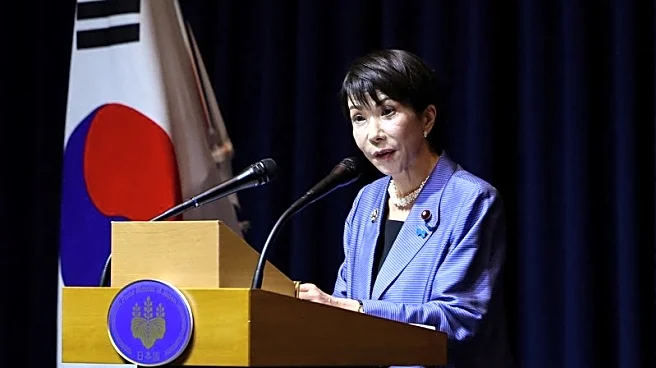By John Geddie, Tim Kelly and Mariko Katsumura
TOKYO (Reuters) -Japanese Prime Minister Sanae Takaichi sparked a diplomatic spat with China over remarks last week that a hypothetical Chinese attack on democratically-ruled
Taiwan could trigger a military response from Tokyo.
Until now, Japanese leaders have avoided mentioning Taiwan when publicly discussing such scenarios, maintaining a strategic ambiguity also favoured by Tokyo's main security ally, the United States.
Her remarks triggered a threatening post from a Chinese diplomat in Japan, while Beijing lodged a formal protest against what it said was blatant interference in its internal affairs. Beijing claims Taiwan, and has not ruled out using force to take control of the island.
WHAT DID TAKAICHI SAY?
Takaichi was asked by an opposition lawmaker in parliament on Friday about "survival-threatening situations", a legal term that allows Japan's premiers to deploy the country's Self-Defense Forces.
In response, she gave an example that an attempt to bring Taiwan completely under the control of Beijing using battleships and military force could constitute such a situation.
She later added that an attack on U.S. warships sent to break any Chinese blockade on Taiwan could require Tokyo to intervene militarily to defend itself and its ally.
Taiwan sits just over 110 km (68 miles) from Japanese territory and the waters around the island provide a vital sea route for trade that Tokyo depends on. Japan also hosts the largest contingent of U.S. military overseas.
WHY DOES IT MATTER?
The survival-threatening situation was defined broadly in a controversial 2015 law that expanded the scope of when the pacifist country's military could act. The law, which marked a drastic shift in Japan's post-war security policy, was met with large protests at the time.
Takaichi, a hardline nationalist who took office less than a month ago, also infuriated Beijing by publicising her meeting with a Taiwanese representative at a regional summit in Seoul in early November.
The spat threatens to sour relations between Asia's two largest economies which had been on a sounder footing in recent years.
Chinese President Xi Jinping has ordered his military to be ready to take Taiwan by 2027, U.S. officials say. But many analysts see that as an attempt to galvanize his military rather than a timeline for invasion.
WHAT WAS THE RESPONSE?
China's Consul General in the Japanese city of Osaka shared a news article about Takaichi's remarks on Saturday and commented: "the dirty head that sticks itself in must be cut off".
Tokyo said the comments made on social media site X were "extremely inappropriate". The diplomat's comments were later deleted.
Beijing said Takaichi's remarks seriously violate the spirit of a 1972 agreement between the two countries, under which Japan acknowledged the People's Republic of China as the sole legitimate government of China and said it "understands and respects" Beijing's position on Taiwan.
Responding to China's protest, Japan's Chief Cabinet Secretary Minoru Kihara on Tuesday reaffirmed Japan's commitment to the 1972 agreement and said Tokyo hoped Taiwan issues would be resolved peacefully through dialogue.
Takaichi on Monday said her remarks were "hypothetical" and that she would refrain from making similar comments in parliament again.
(Reporting by John Geddie, Tim Kelly and Mariko Katsumura in Tokyo; Editing by Saad Sayeed)









